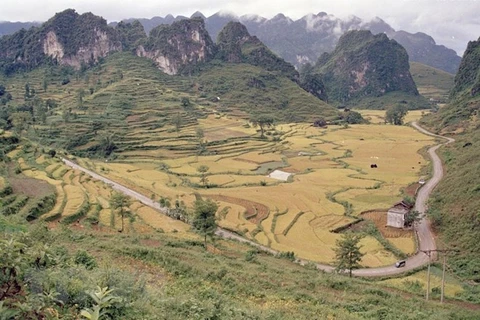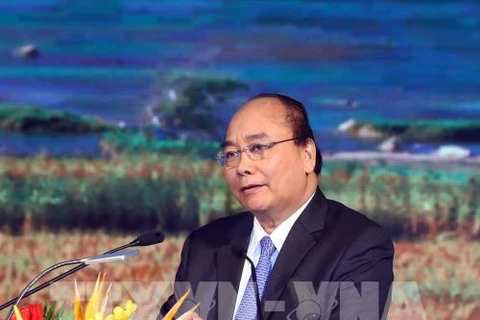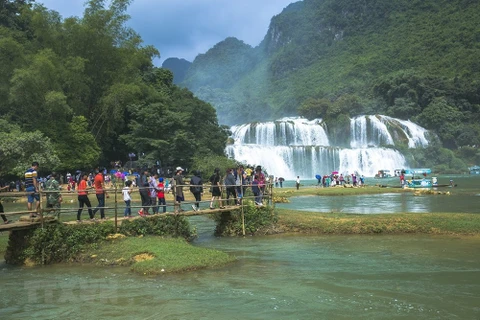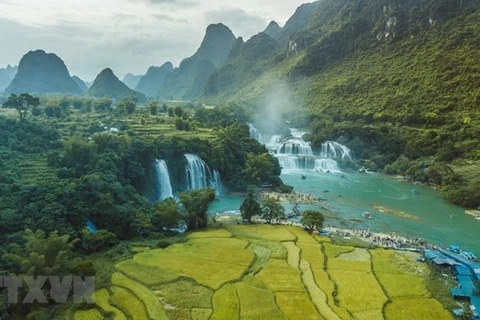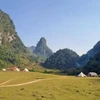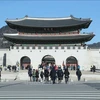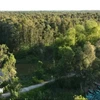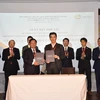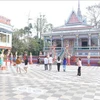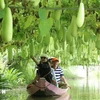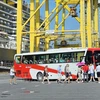 Non Nuoc Cao Bang geopark is home to fossils, ocean sediment, volcanic rocks, minerals and especially karst landscapes. (Photo: VNA)
Non Nuoc Cao Bang geopark is home to fossils, ocean sediment, volcanic rocks, minerals and especially karst landscapes. (Photo: VNA) Cao Bang (VNA) – Measures to promote sustainable tourism development in the northern mountainous province of Cao Bang through UNESCO global geopark model were discussed by domestic and foreign scientists at an international conference held in the locality on May 8.
According to Vice Director of the Vietnam National Administration of Tourism’s Travel Management Department Pham Le Thao, the UNESCO recognition of Vietnam’s Non Nuoc Cao Bang Geopark as a global park is significant to tourism development in the country.
Cao Bang province should fully take advantage of both domestic and international cooperation to turn itself into an attractive destination based on the geopark’s outstanding characteristics, she suggested.
Meanwhile, Dr Jutta Weber from the Germany’s Bergstrasse-Odenwald Geopark and Vice President and Coordinator at the Global Geoparks Network in the Asia-Pacific Prof. Ibrahim Komoo, shared the same viewpoint as they laid stress on the significance to raise public awareness of geological protection while developing new tourism products.
They said that local residents should know how to develop tourism without influencing the environment.
Participants at the event shared initiatives to promote local staples and gender equality, as well as experience in sustainable tourism development in global geoparks in Tanzania, Thailand, Iran and Dong Van Karst Plateau, and protecting values of geological heritages and caves.
Vice Chairman of the provincial People’s Committee Nguyen Trung Thao said that the province hopes to receive further support from competent ministries and sectors, Vietnam National Commission for UNESCO, UNESCO Global Geoparks Network and domestic and foreign experts to develop Non Nuoc Cao Bang global geopark.
Non Nuoc Cao Bang is about 300 kilometres from Hanoi. Covering over 3,000 sq.km, the geopark is home to fossils, ocean sediment, volcanic rocks, minerals and karst landscapes, which can give researchers insight into the 500 million years of the earth’s history.
The park is well known for its rich biodiversity and many indigenous species of fauna and flora.
The site includes famous destinations such as Thang Hen Lake, Phia Oac ecological site and Nguom Ngao Cave.
The geopark was first established in 2015. In November 2016, the province People’s Committee submitted a dossier to UNESCO to seek the global geopark classification. A UNESCO survey team came to the province in July 2017 to assess the park’s values and conservation work.
"Non Nuoc Cao Bang UNESCO Global Geopark offers numerous outstanding historical and archaeological sites and a rich cultural heritage of national and international significance, lending the area prominence in Vietnam and providing a strong basis for the tourism industry as it attracts large numbers of domestic and international visitors,” read the UNESCO statement. “In addition, numerous international and national geosites such as fossil sites, geological boundaries, mineral deposits and intrusive, volcanic and sedimentary rocks are well preserved."
This is the second UNESCO-recognised global geopark in Vietnam after Dong Van Karst Plateau in the northern province of Ha Giang, which received the honour in 2010.-VNA
VNA
